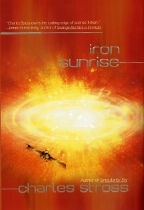Iron Sunrise
Charles Stross
Ace / Penguin Putnam
US First Edition Hardcover
ISBN 0-441-01159-4
Publication Date: 07-01-2004
355 Pages; $23.95
Date Reviewed: 11-15-04
Reviewed by: Rick Kleffel © 2004

REFERENCES
COLUMNS
|
|
|
Iron SunriseCharles StrossAce / Penguin PutnamUS First Edition HardcoverISBN 0-441-01159-4Publication Date: 07-01-2004355 Pages; $23.95Date Reviewed: 11-15-04Reviewed by: Rick Kleffel © 2004 |
|
|
REFERENCES |
COLUMNS |
When a star explodes in the universe according to Charles Stross, it's more than a Big Bang. It might be happenstance, but it's a cue to deploy cutting-edge physics and the first clue that there are some very ill-intentioned beings about. When Wednesday, the plucky teenaged girl who escapes the stellar explosion happens to hear voices, it could be coincidence but it's not bloody likely. But when UN Agent Rachel Mansour is called to the carpet for exceeding her expenses under her cover identity as part of the entertainment corps, then readers should have no doubt. It's enemy action, in the form of 'Iron Sunrise', an ass-kicking, takes-no-prisoners science fiction spy adventure from high-flying Charles Stross.
If 'Singularity Sky' was a lucky bag of scientific speculation, then 'Iron Sunrise' is a spy kit, fresh, gleaming with deadly surprises and quite mysterious until it's almost entirely unpacked. A lot of people are going to call this novel a space opera, and while it presents the appearance of space opera, what readers really have to hand in 'Iron Sunrise' is a spiky, speculative spy story set several hundred years in the future. Humanity has been flung like a handful of seeds, across the galaxy by the not-so-benevolent, almost-godlike artificial intelligence that calls itself the Eschaton. But, as with 'Singularity Sky', there is a bit of unpacking to be done, and that proves to be about two-thirds of the fun.
After the titular stellar detonation, a slow motion disaster unfolds. Not only is the populated world of New Moscow destroyed. The remaining Muscovites have (probably falsely) determined that the world of New Dresden is to blame, and they've set planet-killing nukes on a course to destroy it. Survivor Wednesday certainly has some vital clues as to what happened and why. And Rachel Mansour, UN Black Ops specialist, fresh from preventing a nuclear performance art catastrophe (don't ask, just wait for the tension and laughs to unroll; it's worth it) finds herself popped out of the frying pan and into the stellar fire.
Following hot on the heels of 'Singularity Sky', readers will believe that they can walk right into 'Iron Sunrise' and grok what's going on. They'll be wrong. Stross has a lot to unfurl and the fact that he's writing a spy novel here means that he's going to be pretty sneaky in laying out the plot. Plus, he's got about 600 pages of ideas that he deftly crams into a 350-page novel. It makes for a dense but enjoyable opening as readers figure out who the players are and what the deal is.
That deal is Mansour -- Rachel Mansour. She's back and she's not taking anything for granted. Readers shouldn't either. Though it might appear as if the novel is escaping Stross with its faster-than-light velocities and the time travel they imply, really, everything is under control. But it's a giddy, I'm-having-too-much fun control. Stross deploys set-pieces and puzzle pieces with glee and seemingly at random. But readers should know by now, that there are no coincidences. 'Iron Sunrise' is without doubt enemy action.
Joining Rachel Mansour is a cast of characters that reach surprising depths there in the depths of space. A warblogger, a wily clown, and your basic bureaucratic nightmare all grow flesh as easily as if Stross had access to the vats that other science fiction writers are always on about. But Stross has only words and those he uses with a wicked sense of humor. Amidst the mind-blowing speculation, Stross manages to breath life into characters with the crackling electricity of a verbal Doctor Frankenstein. But his monsters never escape his control.
As much fun as all the speculation and wild characterization is, the novel really takes off in the long and compelling final scene. As readers finally put together the puzzle, everything around the characters starts to fall apart. Stross orchestrates a huge and intricate scene of action like a master, moving his pieces with grace and economy in a game that reveals the spy-novel nature of 'Iron Sunrise' while entertaining the heck out of the (literally) star-struck reader. And he offers a coup-de-grace for dessert that's as satisfying as chocolate.
Though I may take pains to point out the spy-novel nature of 'Iron Sunrise' it is a thoroughly satisfying science fiction novel as well, full of the kind of meaty speculation and intelligent invention that has drawn readers since the dawn of time, or at least the 1930's. In spite of how modern and clever 'Iron Sunrise' feels, it also offers the deep satisfaction of science fiction as many readers first experienced it. Current scientific understanding is entertainingly extrapolated into a rip-roaring plot. Spunky girls, usually dressed in black, lead the action. The nuclear family is confined to a small space until it reaches a meltdown point. Stross has been down this road twice now, and a third novel featuring Rachel Mansour had better be in progress. It's certain to be fun, even if something bad is afoot, Ms. Mansour. After all, once ('Singularity Sky') is happenstance. Twice ('Iron Sunrise') is coincidence. Three times is enemy action. Your fingers are on the keys, aren't they, Mr. Stross? Very well, then. Proceed.